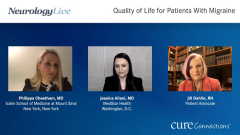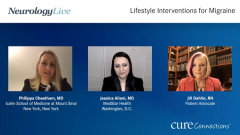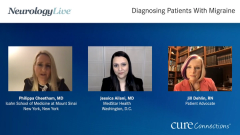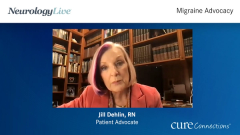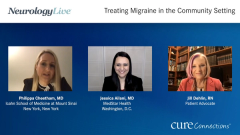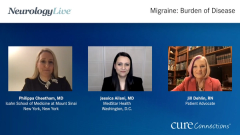
Diet and Weather as Triggers of Migraine
Types of foods and weather conditions that may trigger migraine attacks.
Episodes in this series

Jill Dehlin, RN: I also wanted to mention that food triggers can be tricky.
Philippa Cheetham, MD: You read my mind.
Jill Dehlin, RN: Many times, when people have a migraine, they will rack their brain: “What did I eat?” Before you know it, they cannot eat anything. It is oppressive, and patients with migraines may have people telling them they shouldn’t eat aged cheeses and they should not eat charcuterie. People may tell patients with migraine, “You shouldn’t eat this, you shouldn’t eat that, you need go gluten-free and try this or try that.” Early on in my journey, I did an elimination diet just to shut people up because it is exhausting to get all this advice from people about what I should and should not eat or do.
Philippa Cheetham, MD: I was just going to say that we often hear about the effects of alcohol, and people talk about the tannins in red wine and the nitrites. Do you find that alcohol is a trigger for you?
Jill Dehlin, RN: When I first became chronic, I did not drink for 10 years. People would try to cajole me into drinking. They would say, “Have you tried this gluten-free vodka? Have you tried this or that?” Yes, I have, and no, I cannot. Now that my migraines are in better control, I can have 1 glass of wine a day, but no more than that, and it cannot be chardonnay. I have found different kinds of wine that I can tolerate, but I will tell you, when you are in the middle of chronic migraine, the last thing you want to do is celebrate with a glass of something and then pay for it for 3 days with a screaming migraine attack. You decide that it is just really not worth it. The good news about that is that I became everybody’s favorite designated driver.
Philippa Cheetham, MD: That’s right.
Jill Dehlin, RN: There are other triggers that patients with migraine cannot avoid, like weather, and I am so grateful that that is not a trigger for me. I will get a migraine if I am in an airplane too long, especially if I have crossed over several time zones. But other than that, weather doesn’t bother me. It sure does bother lots of people.
Philippa Cheetham, MD: Yes. It is fascinating when you talk to friends who have migraines because often, they can predict the weather and tell you 24 to 48 hours before a storm is coming. It is really fascinating that low pressure seems to be such a trigger. Why is that, Dr Ailani?
Jessica Ailani, MD: Researchers and medical professionals actually have not figured out if it is low pressure or high pressure or just pressure shifts that act as a trigger. There is a lot of controversy around weather as a trigger. I’m a strong believer that it is a trigger. We are in the Washington, DC, area, so we are the swamp of the United States; we get everybody’s weather patterns. Since moving to this area, I have watched my patients react. The volume of phone calls from patients with migraines jumps right before a major storm and then it calms down. We can actually predict when there is a major storm coming. I know that the weatherman is right because the call frequency bumps up right before a major storm. I know if it is really going to snow or rain based on our call volume.
It is very unclear, when considering the barometric pressure shift, how that affects our brains. There are a lot of theories. Does the pressure shift actually cause fluctuations in CSF [cerebrospinal fluid] pressure in some way? Does it cause pulsation shifts in our blood pressure that somehow trigger some kind of shift in the brain itself? None of this has actually been proven to be accurate. We just see that in many areas, it can occur. I had a conversation with a colleague because I was fascinated by this. What if a patient moved to a drier location or locations with less pressure shifting? This is a colleague who is on the West Coast. He said in that region, they see patients who have migraines triggered by tides. If the tide is strong, it can trigger migraines, which relates to the shift of the moon’s gravitational pull. It goes back to balance shifting; anything that shifts balance seems to trigger migraines.
Philippa Cheetham, MD: Thank you for watching Neurology Live® Cure Connections®. If you enjoyed the program, please subscribe to our e-newsletter to receive upcoming programs and other great content right in your in-box. Thank you so much.
Transcript Edited for Clarity
Newsletter
Keep your finger on the pulse of neurology—subscribe to NeurologyLive for expert interviews, new data, and breakthrough treatment updates.




